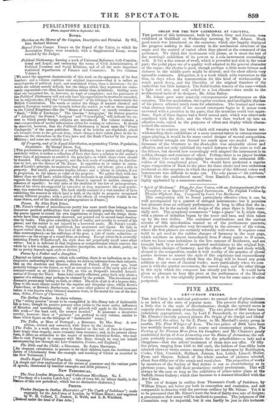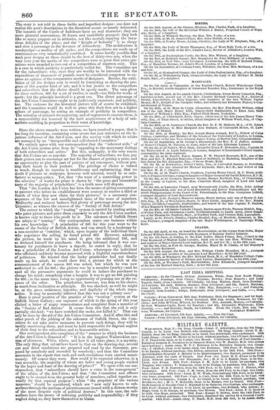FINE ARTS.
ART-UNION PRIZES.
THE Art-Union is a national gustometer: its annual show of prize-picture& is an index of the state of popular taste. The present display indicates- a little rise in the scale of discrimination; though the upward move ill scarcely above the mark of mediocrity. The two prizes of 3001. have been judiciously appropriated: one, by Lord F. Beauclerck, to the purchase of Mr. Elmore's cleverly painted picture The Origin of the Guelph and Ghael line Quarrel; the other, by Sir E. Perry, to Mr. Marshall's pretty group in marble, The First Whisper of Love. The two prizes of 2001. have been- less worthily bestowed on Hart's coarse and commonplace picture, The' Parting of Sir Thomas Afore from his Daughter; and Mr. Claxton's gaudy academical destn of Jews Lamenting over the Ruins of Jerusalem; the sub. jects probably possessing attractions for the prizeholders—a lady and clergyman—that the artists' treatment of them does not offer. Of fifty five prizes, ranging from 150/. to 50/. each, the holders of four-fifths have selected views or rustic scenes: among them are landscapes by Boddingtorr, Cooke, Clint, Creswick, Holland, Jutsum, Lee, Leitch, Linnell, Muller, Pyne, and Shay-cr. Indeed, of the whole number of pictures selected; about four-fifths are of the scenic and rural class. The proportion of works- by members of the Society of Bad Artists is not so overwhelming as in previous years; but still their productions unduly predominate. This will' always be the case so long as the exhibition of prizes takes place at the Suffolk Street Gallery; which thus becomes in a manner identified with the Art-Union.
The set of designs in outline from Thomson's Castle of Indolence, by-- William Rimer, are below par both in conception and execution, and not' comparable in drawing with the previous outlines by Mr. Selons. Yet it fe- te be presumed that Mr. Rimer's were the best of thirty-two sets of designs; a presumption that many will be inclined to question. The judgment of the. Committee may be impartial, but it can hardly be just in this instance:
The story is not told in these feeble and imperfect designs: one does not realize the poet's descriptions in the theatrical scenes so tamely delineated. The inmates of the Castle of Indolence have no real character; they are mere pictorial conventions, ill drawn and unskilfully grouped: they look like so many puppets set in attitudes, not like mortals enjoying the luxu- rious delights of the place; and the "Knight of Industry" is as sleepy and slow a personage as the devotees of debauchery. The architecture is nondescript—a medley of all styles; and the compositions are made up of reminiscences very unartistically combined. It seems hardly possible that Such poor designs as these should be the best of thirty-two sets, when the very next year the merits of the competitors were so great that extra pre- miums were awarded to two out of a competition of nineteen only. This is a case in which publicity is particularly called for. The Committee act for the subscribers; who, since they are worthy to be intrusted with the expenditure of thousands of pounds, must be considered competent to ex- press an opinion of the comparative merits of designers. Besides, the exhi- bition of all the designs sent in would be interesting as showing the pro- gress of this popular kind of art; and it is but justice to the competitors and subscribers that the choice should be openly made. The sum given for these outlines, 601. for a set of twelve, is small—too little for works of merit; but the principle involved is a great one. The direct patronage of the Art-Union Committee ought to be judiciously exercised; and publicly, too. The cartoons for the historical picture will of course be exhibited; and the Committee would do well to grace this their first act in a higher sphere of patronage, by setting an example of publicity in competition. The selection of pictures for engraving, and of engravers to execute them, is a responsibility not lessened by the tacit acquiescence of a body of sub- scribers confiding in proportion to their want of knowledge.



























 Previous page
Previous page